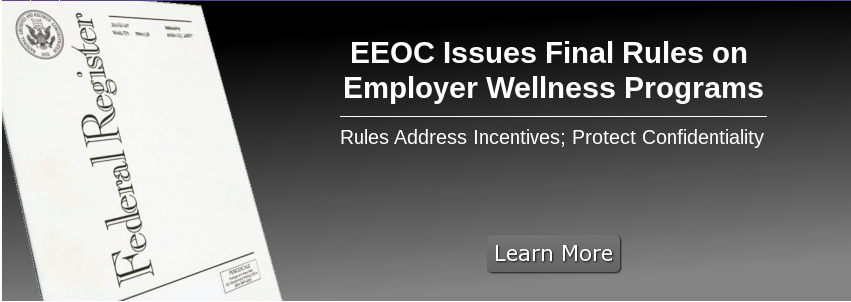Transparency is extremely important to us, so we are letting you know that we may receive a commission on some of links you click on from this page. See our disclaimer.
 The U.S. Equal Employment Opportunity Commission released “final rules” on Employer Wellness Programs this week. As a USA Today headline states: “EEOC says wellness program participation can reap big rewards.”
The U.S. Equal Employment Opportunity Commission released “final rules” on Employer Wellness Programs this week. As a USA Today headline states: “EEOC says wellness program participation can reap big rewards.”
The EEOC’s new rules “describe how Title I of the Americans with Disabilities Act (ADA) and Title II of the Genetic Information Nondiscrimination Act (GINA) apply to wellness programs offered by employers that request health information from employees and their spouses. The two rules provide guidance to both employers and employees about how workplace wellness programs can comply with the ADA and GINA consistent with provisions governing wellness programs in the Health Insurance Portability and Accountability Act, as amended by the Affordable Care Act (Affordable Care Act).”
The new rules offer clarity that many employers have sought in order to move forward confidently with well-designed wellness programs.
As Healthcare Dive reports: “The two rules provide guidance to both employers and employees about how workplace wellness programs can comply with the ADA and GINA consistent with provisions governing wellness programs in the HIPAA, as amended by the ACA.”
In addition, “The rules permit wellness programs to operate consistently with their stated purpose of improving employee health, while including protections for employees against discrimination.”
There are several key components to the new rules:
Privacy. The EEOC states: “The two rules also make clear that the ADA and GINA provide important protections for safeguarding health information. The ADA and GINA rules state that information from wellness programs may be disclosed to employers only in aggregate terms.”
Incentives. “Both rules prohibit employers from requiring employees or their family members to agree to the sale, exchange, transfer, or other disclosure of their health information to participate in a wellness program or to receive an incentive,” writes the EEOC.
Healthcare Dive amplifies: “Wellness programs in group health plans that ask employee health questions or include medical examinations could offer incentives of up to 30% of the total cost of self-only coverage, according to the final ADA rule. In addition, the final GINA rule states incentives for spouses may not exceed those of the employees. Incentives for the exchange of information about employees’ current or past health status or that of their spouses or children are not permitted.”
Within the wellness industry, reaction has been swift around the improved rules clarity – and what it can mean for companies and their employees when the rules go into effect next year.
“We are glad to see that the EEOC listened to, evaluated and acknowledged concerns from employers, individuals and the industry,” said Interactive Health President and CEO Cathy Kenworthy. “We applaud the assurance that notifications need to articulate forcefully the privacy of individuals. Employees have the right to know how their information is being used. We were pleased to participate in a cross-industry comment process led by the Health Enhancement Research Organization (HERO). Additionally, the EEOC’s ruling synchronizes the regulatory framework among the Affordable Care Act and other relevant employment laws. This is strongly positive.”
Meanwhile, USA Today reports that “Bryce Williams, CEO of HealthMine, a data analytics company for wellness plans, doesn't think the new rules will discourage wellness programs and instead thinks they could now become more common among smaller companies.”
“The rule requires enough disclosures to address concerns and is ‘measured and appropriate’ given the large investment employers are making in workers' health, he says.”




0 Comments